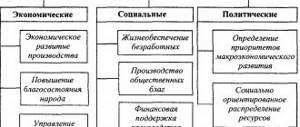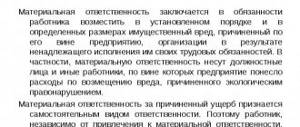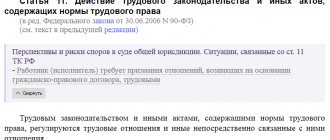All participants in legal relations have rights and obligations. They are regulated by current legislation. The interaction between an employee and an employer is no exception. Having decided to hire an employee, an entrepreneur must study the labor rights and responsibilities of the employee . They are reflected in the Labor Code of the Russian Federation. Violation of established norms is fraught with sanctions. We will talk further about how to ensure the fundamental rights of workers, about duties and responsibilities, and possible consequences in case of failure to comply with the requirements.
Current legislation regulating the rights and obligations of employees and employers
The law protects the rights and interests of workers who decide to work for an employer. The main legal act regulating the peculiarities of the relationship between the parties is the Labor Code. The main categories of employees are reflected in Chapter 4 of the Labor Code of the Russian Federation.
The list included:
- minors;
- temporarily unemployed persons;
- disabled people;
- women with children;
- shift workers;
- persons working in shifts.
Each category has special legal nuances. An employment contract is concluded with employers. Its main aspects are reflected in chapters 11-13 of the Labor Code of the Russian Federation. The fourteenth chapter states that the rights and interests of workers must be taken into account when fulfilling labor obligations. Personal information is not subject to disclosure.
Rights of workers in accordance with the law
The specifics of interaction between the parties are reflected in the Employment Agreement. It also fixes a point regarding the rights and obligations of employees. Before signing the document, you need to read this section.
The list of basic rights of workers under the Labor Code includes:
- the ability to conclude an agreement on acceptable terms;
- the right to receive exactly the position reflected in the agreement;
- the right to wages and rest;
- the right to accurate information about the workplace, working conditions and the specifics of its payment;
- the right to receive training from the employer;
- the opportunity to participate in a trade union;
- the right to protect interests;
- the right to compensation for damage if it was caused during the performance of work duties;
- the right to pension and social insurance.
The employer pays personal income tax for the employee in the amount of 13%. This is the only deduction that can be taken from wages. The amount cannot be reduced.
Video
What is the structure of the job description?
The employer is free to choose the structure of the job description: it can be a document with a single section - a list of the employee’s job responsibilities, or a complex text with paragraphs, sections, and a detailed description of all production processes.
General provisions
In this section, as a rule,
- describes the position, its name, the basic requirements for the employee - the presence of special education, qualifications, length of service, work experience;
- the person appointing the employee to the position and dismissing the employee from the position is indicated;
- documents are determined that the employee must follow in his activities;
- the procedure for replacing an employee and his subordination is established.
Responsibilities
It is necessary to draw up a list of the employee’s specific responsibilities; they can be conditionally divided into general functional responsibilities and special responsibilities. It is recommended to avoid duplication of employee responsibilities specified in the employment contract.
Rights
In this section it is advisable to list the employee’s powers. There is no need to duplicate the employee’s rights established in the Labor Code of the Russian Federation and the employment contract.
Responsibility
There is an opinion that the section is optional, since the employer does not have the right to introduce new types of liability in comparison with those established by law.
Interaction
This section determines the position of the position (employee) in the company, establishes special responsibilities in relation to other structural divisions of the company, other employees, managers and subordinates. For example, relationships with accounting, labor protection services, and various levels of management are regulated.
Ways to ensure workers' rights
The responsibility to respect the interests of employees rests with the employer. The rights of the employee under the Labor Code are placed above all else. However, the company's interests are also protected.
The employer is obliged:
- conclude an employment or collective agreement by mutual consent;
- provide the employee with a workplace and tools to complete the task. All materials are purchased at the expense of the company;
- transfer wages at least twice a month on the due date;
- establish a work and rest schedule, following the current regulations;
- promptly provide information to the employee regarding the fulfillment of labor obligations, income, days off and vacation;
- pay for advanced training, if there is a need for such;
- do not interfere with the employee’s desire to participate in trade union organizations;
- listen to suggestions for improving the company’s performance;
- resolve emerging conflicts;
- provide compensation for harm caused to an employee during the performance of labor obligations;
- ensure social insurance of a person by providing contributions to funds.
The employer makes any changes to the employment contract only with the consent of the employee. The provisions reflected in the agreement cannot contradict the norms of the Labor Code of the Russian Federation.
Employment contract form
Salary
The current employee remuneration system is a mandatory condition of the employment contract under Art. 57 of the Labor Code (LC). Based on Art. 136 of the Labor Code, the employee must clearly understand on what day he will receive his salary, in what amount, and what will be the compensation for delayed salary . The employer pays wages in the manner specified in the employment contract.
Wages are the employee’s remuneration for work depending on the qualifications, quality and quantity of work performed (according to Article 129 of the Labor Code). The parties determine the amount of wages by agreement; it is not limited by law. The only thing guaranteed by law is the payment of wages in the amount of at least the regional minimum wage.
According to the Labor Code, an employee is guaranteed payment of wages at least 2 times a month. When an employee is dismissed, payment is made to him on the day of dismissal, but not later. Vacation pay is paid at least three days before the vacation, and not after it.
When dividing wages into salary and bonus parts, the employee needs to familiarize himself with the documents that regulate the payment of bonuses. If the employer pays a bonus only at his own discretion, then the employee’s rights are infringed, and if the bonus is not paid, he will not be able to demand compensation for damages. Therefore, you need to try to clarify the conditions and indicators of bonuses in the company (what the bonus is paid for), whether non-payment of the bonus is allowed, and whether the company has a provision on bonuses.
If the employment contract specifies only part of the promised earnings (in other words, we are talking about a “gray” salary or a salary “in an envelope”), then the employee needs to be aware of all the risks of this state of affairs. When signing such an agreement, the employee puts himself in a vulnerable position and in case of any conflict with the employer risks :
- Don't get paid.
- Don't get vacation pay.
- Do not receive social benefits related to education, childbirth and pregnancy, sick leave pay, severance pay in case of staff reduction.
It is important to take into account that the employer’s ability to arbitrarily change the existing employee remuneration system is quite limited. All changes must be agreed upon with the employee, in accordance with Art. 72 TK. If an employee does not agree to worsening the terms of payment for his work, then he can refuse the employer’s offer without any sanctions.
But in the case when the employer, due to organizational and technological conditions, can no longer pay the employee in the same amount, then it is allowed to change the amount of payment at the initiative of the employer on the basis of Art. 74 TK. In this case, the employer is obliged to notify the employee of upcoming changes no later than 2 months in advance. If the employee does not agree to continue working under the new conditions, and the employer cannot offer an alternative, then he has the right to terminate the employment contract on the terms of payment of severance pay.
The employee should know that, according to the provisions of Art. 134 of the Labor Code, his salary must be regularly indexed taking into account inflation processes . Rostrud in its explanations emphasized that indexation is mandatory not only for state and municipal enterprises.
Any delays in wages are outside the legal framework. The employer is obliged to compensate the employee for the damage caused to him as a result of the delay and pay compensation for each day of delay. The minimum amount of compensation is 1/300 of the Central Bank key rate for each day of delay. The employee has the right to suspend work until the debt is fully repaid. If there is a delay of more than 15 days, the employee has the right, with prior notice to the employer, to suspend work until he is paid the full amount of his due earnings (based on Article 142 of the Labor Code).
In addition to the employment contract, information about wages may be contained in a collective agreement or regulations on wages, in particular, on advance payments, final payments, stipulated bonuses and compensations.
Based on the results of the month, the employee is given a payslip with accruals and deductions.
When can an employer deprive an employee of bonuses?
Additional rights granted to an employee under the Labor Code
The basic rights of an employee are reflected in the Labor Code of the Russian Federation. Failure to comply with them is strictly punishable. However, it is acceptable to include rights and obligations in an employment contract. This is possible only if the new provision does not contradict the norms of current legislation.
Please note: Information is recorded by agreement with the employee. The corresponding norm is reflected in the contract. Changes are fixed by local regulations. They are signed by the employee and the employer. The company cannot adjust the provisions of the agreement solely at its own request.
Working conditions
Chapter 36 of the Labor Code obliges the employer to provide employees with a safe workplace and labor protection. The workplace should be safe not according to the employer, but based on current regulations. For example, noise and radiation standards must be observed, free equipment must be used, etc. The employee must receive all the necessary protective equipment: gloves, masks, gowns, mats, etc.
Working conditions of the employee according to the standards of Part 2 of Art. 209 Labor Code is the sum of factors in the working environment and the labor process that affect the performance and health of workers. According to Art. 22, 212 of the Labor Code, the employer’s responsibilities include providing complete and reliable information about the workplace, as well as guaranteeing safe working conditions to employees. The workplace is understood as the place where an employee must be present in connection with the performance of work functions.
Working conditions are determined based on the results of a special labor assessment. The need for such an assessment is indicated in Art. 212 TC and FZ-426 of 2013 “On special assessment of working conditions.” A special assessment is an independent examination to identify harmful production factors and the magnitude of their deviations from the standard, assess their impact on an employee, and assess the effectiveness of using collective (individual) protective equipment.
Based on Art. 209 of the Labor Code, harmful and dangerous working conditions include those if production factors can lead to illness or injury to an employee.
The result of a special assessment of working conditions (SOUT) is the establishment of their classes depending on the harmfulness and danger:
- optimal (class 1) – working conditions are safe for the employee, there are no harmful or dangerous factors in the workplace;
- acceptable (class 2) – there are harmful factors, but they affect the employee within normal limits;
- harmful (class 3) – exposure to harmful factors is higher than permissible;
- dangerous (class 4) – hazardous working conditions, work in which threatens the life of the employee and carries the risk of acute occupational diseases.
Depending on the working conditions, the rates of insurance premiums that the employer pays for employees for injuries are determined. Based on Art. 57 of the Labor Code, the employee must be notified of harmful and dangerous working conditions, as well as guarantees and compensation for this. The specified information is included in the employment contract.
Workers are also guaranteed the right to annual preventive examinations. During these examinations, their health is checked, taking into account occupational risk factors, and conclusions are drawn regarding the possibility of work.
Labor protection is provided by the state. The employee will have to undergo safety training.
Present duties and responsibilities that the employee bears under the Labor Code
Like the rights, the duties of employees are fixed by the Labor Code of the Russian Federation. The provisions are reflected in Article 21 of the above-mentioned legal act. They are also recorded in the contract.
Video
The list of responsibilities includes:
- performance of work in accordance with the contract;
- compliance with the internal regulations of the organization and discipline;
- compliance with safety regulations;
- incurring financial liability, if provided for;
- proper performance of job duties;
- notifying management about the occurrence of a risk of accidents or other danger.
The employee’s responsibilities under the Labor Code of the Russian Federation are fixed in the employment contract in the form of a table or list. It provides a brief description of the functions that the employee must perform. The full list is recorded in the job description. Chapter 9 of the Labor Code fixes the financial responsibility of the employee to the employer. It is divided into 2 types - individual and collective. In the first case, a specific employee bears financial responsibility to the organization. If responsibility is collective, a whole team of employees is responsible for the safety of valuables. If damage is caused, liability is distributed proportionally or equally.
The employee’s financial liability to the employer can be full or limited. In the first case, repayment is made of all losses incurred by an employee of the enterprise during the performance of labor functions. The corresponding type is most often used if work is carried out in banks or other financial organizations.
Please note: Other companies usually provide for partial financial liability of the employee to the employer. In this case, the employee repays losses only to a certain extent. To do this, a percentage of the amount of damage is deducted from the employee’s salary. The corresponding rule is enshrined in Chapter 39 of the Labor Code of the Russian Federation. The price of the property decreases annually by the depreciation percentage. The corresponding provision is also fixed in the employment contract.
The employee bears financial responsibility if he is 18 years old and a corresponding agreement has been signed or the fact has been reflected in the employment contract. If a liability agreement is signed, the employee is responsible for the company’s property on an equal basis with the employer. Compensation for damages occurs in proportion to fault. If an employer has violated the rights of an employee and has not complied with the provisions of the employment contract and the law, the person may go to court to protect his rights and interests. However, it is not always possible to achieve a positive solution. Typically, a similar situation arises in cases where the drafting of an employment contract was carried out with violations. If the document included information about which the person was not notified, you can defend your interests by contacting a lawyer.
Video
Form
The standard form of job responsibilities contains general information, which is specified by the personnel department specialists of each individual enterprise or organization, in accordance with the structure, specifics of activity, etc.
The instruction - a sample of functional responsibilities - can be formatted in different ways:
- annex to the employment contract. In this case, the document is adjusted by agreement of both parties;
- a separate document, which can also be amended. The employer approves it independently, and the applicant gets acquainted and, if necessary, asks to specify individual points. It is impossible to add new labor functions that are not stipulated by an employment contract, only in accordance with Article 74 of the Labor Code of the Russian Federation.
Guarantees provided and obligations of the employee under the Labor Code
The employer who hires the employee is obliged to provide him with a workplace and appropriate materials. The company establishes internal regulations and specifics of remuneration. If violations occur, the rights and interests of the employee are protected by the Labor Code of the Russian Federation. Guarantees are enshrined in Article 220 of the Labor Code of Russia. If the company is closed or does not operate for any reason and it is not the employee's fault, the person retains the right to receive wages. Moreover, its size remains the same as reflected in the employment contract. If a position held by an employee is temporarily closed, the employer will provide the employee with another position. However, the right to the basic salary is retained.
Please note: If a danger to life and health is found while performing a job function, the employee has the right to refuse to perform work until the current situation is eliminated. The person is transferred to a less dangerous place. If the position is unavailable, the employee is sent on paid leave. If the person has previously used the corresponding opportunity, additional rest is provided at the expense of the employer.
The idle period is paid in accordance with the tariffs established by the employer. The amount cannot be less than the minimum wage in the region. If an employee does not want to fulfill obligations because his health or other employees have been harmed, the company cannot bring the person to disciplinary action.
Video
When a person is injured or his property becomes unusable due to the performance of a job function, the need to pay compensation falls on the employer. If the company refuses to pay compensation, the person has the right to go to court. Additionally, it is allowed to claim for material damage. It is permissible to use any methods to assert rights if they do not contradict the norms of current legislation. So, it is permissible to involve a lawyer.
Ensuring basic rights of employees
Directly follow from the obligations of employers prescribed by labor legislation. An employee who assumes the functions of concluding an employment contract can count on the following rights.
- The concluded employment contract is a reciprocal document, so the employee can, for his part, initiate its signing, modification and termination within the framework of federal law.
- Through their representatives, personnel have the right to influence the collective agreement: negotiate, conclude collective agreements, and monitor the implementation of the provisions of the agreement.
- The concluded employment contract guarantees the unfailing provision of appropriate employment.
- An employee who comes to work can count on a workplace equipped according to accepted standards, the availability of materials, tools, equipment, documents, etc., necessary to perform the functions specified in the contract.
- One of the main goals of employment for an employee - financial security - must be provided regularly and completely (depending on qualifications, complexity of the work performed, its quantity).
- A staff representative can freely rest during the allotted time: during a lunch break, leaving work with a reduced working day, on weekends and holidays, during annual leave or other types of free time provided to him.
- The employee must be timely and fully informed about all the issues he needs regarding working conditions, its organization, safety, including legislative changes.
- If the job requires additional training or education, it must be provided by the employer (within the framework established by the Labor Code and other provisions of the law).
- To ensure and protect his interests, an employee can become a member of any professional associations, unions, organizations.
- The employee has the right to participate in the management of the organization, limited to certain forms provided for by the Labor Code and other regulations.
- If an individual or group conflict arises related to labor disagreements, it must be resolved by the methods established in the Labor Code. The employee is allowed to protect his infringed interests by any methods permitted by law.
- If an employee was harmed in the process of work due to the fault of the employer, he has the right to count on damages and compensation.
- All employees must be provided with compulsory social insurance.
FOR YOUR INFORMATION! The employer is not authorized to reduce the list of personnel rights, but within the framework of concluded employment contracts and/or additional agreements it is allowed to expand it.
Responsibility borne by the employee to the employer for failure to fulfill duties
The employee is obliged to comply with the provisions of the employment contract. If they are not followed, the employee will be held accountable.
It comes in the following types:
- disciplinary;
- administrative;
- criminal;
- material.
First of all, the employer is obliged to assess the severity of the employee’s disciplinary offense. If the employee’s actions did not lead to undesirable consequences, it is necessary to limit oneself to only a verbal remark.
Video
The concept of financial liability is given in Article 238 of the Labor Code of the Russian Federation. It rests with the employee who has entered into an agreement with the employer. The person must compensate for damage caused during the performance of duties. However, if the employer himself is to blame for the situation, it will not be possible to recover funds from the employee. Lost profits are not recognized as losses.
Please note: In accordance with Article 243 of the Labor Code of the Russian Federation, the employee bears full financial responsibility. This means that the person is obliged to compensate the entire amount of losses caused. However, in a number of situations, liability is limited to the size of the citizen’s salary.
A person may be held administratively liable if the provisions of the Code of Administrative Offenses of the Russian Federation are violated. Typically, it involves persons working illegally on the territory of the Russian Federation. However, the Labor Code provides a list of persons who cannot be fired.
The list includes:
- parents of one or more children under 3 years of age;
- single parents raising a child under 14 years of age;
- a person raising a minor citizen who has lost his parents;
- women carrying a child or on maternity leave;
- parents with a disabled minor child;
- other citizens who are protected by law.
Video
Responsibility of employers for violation of rights
The employer also bears financial responsibility to the employee.
Compensation is paid in the following cases:
- illegal dismissal occurred;
- the company does not comply with the requirements of regulatory authorities on labor protection;
- the employee suffered moral damage;
- the employer does not pay wages, sick leave or vacation pay;
- disciplinary action was taken without justification.
If the employer delays wages for more than 15 days, compensation is awarded in the amount of 1/150 of the salary. Additionally, criminal liability is provided. It proposes a fine, imprisonment for up to five years, forced labor and suspension of activities. Thus, the rights and obligations of the employer under the Labor Code of the Russian Federation should not violate the rights of the employee.
Who develops the job description?
- The instruction can be developed by the head of a structural unit or an employee of the human resources department, agreed upon by the immediate supervisor, other responsible persons (chief engineer, deputies, labor protection specialist, lawyer), and approved by the head of the organization.
- The developer of the instructions may be a third-party organization professionally involved in HR management. This is not yet a widespread phenomenon in our country.







